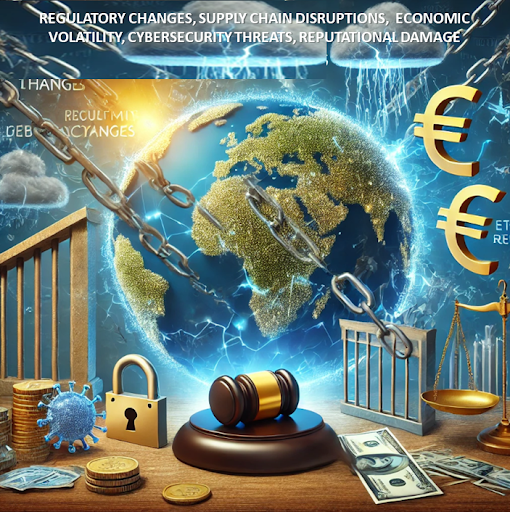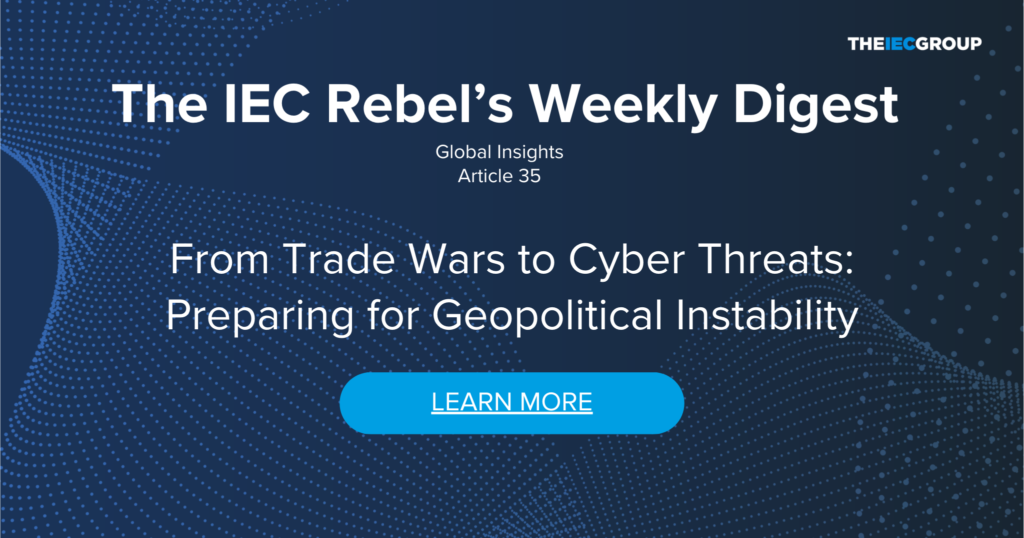From Trade Wars to Cyber Threats: Preparing for Geopolitical Instability
Adapting to a Changing World: Business Strategies for Geopolitical Uncertainty
Introduction
 Globalization has profoundly impacted the business world, creating vast opportunities for expansion, innovation, and efficiency. However, the interconnected nature of global markets also means that companies are increasingly exposed to geopolitical risks.
Globalization has profoundly impacted the business world, creating vast opportunities for expansion, innovation, and efficiency. However, the interconnected nature of global markets also means that companies are increasingly exposed to geopolitical risks.
These risks include political instability, economic sanctions, trade wars, and other forms of geopolitical tension that can disrupt supply chains, alter market dynamics, and create an unpredictable business environment.
This article examines the threats posed by geopolitical instability in a globalized economy and outlines strategies companies can adopt to prepare and adjust to these challenges.
Threats of Geopolitical Instability
- Supply Chain Disruptions
Global supply chains are highly susceptible to geopolitical risks. Political unrest, trade restrictions, and diplomatic conflicts can halt the flow of goods and services. For instance, the US-China trade war led to significant tariffs on goods, disrupting supply chains and increasing costs for companies reliant on Chinese manufacturing.
- Market Access and Regulatory Changes
Geopolitical instability can result in sudden changes to market access and regulatory environments. Sanctions and trade restrictions can bar companies from operating in certain regions or selling to specific customers. The sanctions on Russia following the annexation of Crimea significantly impacted businesses operating in or trading with Russia.
- Currency and Economic Fluctuations
Political instability often leads to economic volatility, affecting currency values and economic stability. Companies operating in politically unstable regions may face hyperinflation, currency devaluation, and economic recessions. The Venezuelan economic crisis is a stark example of how political turmoil can devastate a country’s economy.
- Cybersecurity Threats
Geopolitical tensions often spill over into the cyber realm, with state-sponsored cyberattacks becoming more common. Companies may face increased risks of data breaches, intellectual property theft, and operational disruptions. The 2017 NotPetya attack, widely attributed to Russian actors, caused billions in damages globally, affecting major corporations like Maersk and Merck.
- Reputation and Ethical Risks
Operating in geopolitically unstable regions can pose ethical dilemmas and reputational risks. Companies may be scrutinized for their associations with regimes involved in human rights abuses or environmental destruction. The backlash against companies operating in Myanmar amid the Rohingya crisis highlights the reputational risks involved.
Preparing and Adjusting to Geopolitical Instability
- Risk Assessment and Monitoring
Companies need to implement robust risk assessment and monitoring systems to stay ahead of geopolitical developments. This involves analyzing political trends, economic indicators, and regulatory changes in key markets. Utilizing services from geopolitical risk consulting firms can provide valuable insights and forecasts.
- Diversification of Supply Chains
Diversifying supply chains can mitigate the impact of disruptions in any single region. Companies should consider sourcing from multiple suppliers in different geographical areas. The COVID-19 pandemic underscored the importance of supply chain resilience, with companies like Apple seeking to reduce reliance on Chinese manufacturing by expanding into India and Vietnam.
- Scenario Planning and Flexibility
Engaging in scenario planning allows companies to prepare for various geopolitical outcomes. This involves developing contingency plans for different scenarios, such as trade wars, sanctions, or political unrest. Companies should maintain flexibility in their operations, enabling them to quickly pivot strategies and adapt to changing circumstances.
- Strengthening Cybersecurity
Enhancing cybersecurity measures is crucial in a geopolitically volatile environment. Companies should invest in advanced cybersecurity technologies, conduct regular security audits, and establish protocols for responding to cyber threats. Collaboration with cybersecurity firms and participation in information-sharing networks can bolster defenses against state-sponsored cyberattacks.
- Engaging in Public Affairs and Diplomacy
Building relationships with government officials, policymakers, and industry associations can help companies navigate geopolitical challenges. Engaging in public affairs and diplomacy allows companies to advocate for their interests, influence policy decisions, and gain early insights into regulatory changes. Companies like Boeing and Airbus have established strong lobbying efforts to manage geopolitical risks in the aerospace industry.
- Corporate Social Responsibility (CSR)
Adopting robust CSR practices can help mitigate reputational risks associated with operating in unstable regions. Companies should ensure compliance with international human rights standards, environmental regulations, and ethical business practices. Transparent reporting and engagement with stakeholders can enhance a company’s reputation and build trust with consumers and investors.
- Insurance and Financial Hedging
Utilizing insurance and financial hedging instruments can provide a safety net against geopolitical risks. Political risk insurance covers losses arising from political instability, such as expropriation, currency inconvertibility, and political violence. Financial hedging strategies, including currency and commodity hedging, can protect against economic volatility and currency fluctuations.
- Local Partnerships and Knowledge
Forming partnerships with local firms can provide valuable insights and mitigate risks associated with unfamiliar markets. Local partners can offer expertise in navigating regulatory environments, cultural nuances, and market dynamics. Joint ventures and alliances with local companies can enhance market entry and expansion strategies.
- Employee Training and Safety
Ensuring the safety and well-being of employees in geopolitically unstable regions is paramount. Companies should provide comprehensive training on security protocols, crisis management, and evacuation procedures. Establishing robust communication channels and support systems can aid in safeguarding employees during political unrest or natural disasters.
- Adapting Business Models
In some cases, companies may need to fundamentally adapt their business models to thrive in a geopolitically unstable environment. This could involve shifting from a direct investment model to a franchise or licensing model, reducing exposure to regulatory and political risks. For example, McDonald’s uses franchising extensively to mitigate risks in volatile markets.
Conclusion
Globalization has brought about unprecedented opportunities for businesses to expand and innovate. However, it also exposes them to a complex web of geopolitical risks that can disrupt operations and threaten profitability.
Companies must adopt a proactive and multifaceted approach to managing these risks, incorporating strategies such as risk assessment, supply chain diversification, scenario planning, and cybersecurity enhancement. By preparing and adjusting to geopolitical instability, companies can not only safeguard their operations but also seize opportunities in an ever-changing global landscape.
The ability to navigate geopolitical challenges will increasingly define the success and resilience of companies in the global marketplace. As such, executives and decision-makers must remain vigilant, adaptable, and informed to steer their organizations through the uncertainties of our interconnected world.
Go To’s: Companies must rigorously engage in scenario planning to thoroughly understand potential risks. Our next article will delve into the best practices for scenario planning, ensuring you can maximize the effectiveness of this crucial strategy.
Introducing the IEC Knowledge Network Free Membership – Your Gateway to Seamless Access!
We are thrilled to present a new service that goes beyond the ordinary download experience. In addition to offering you the ability to download the things you love, we are delighted to introduce the IEC Knowledge Network Free Membership.
The Free Membership option grants you access to our library of articles and videos, without the need for tedious registrations for each piece of content.
The publication serves as a trusted resource to support executives in their pursuit of sustainable and successful global expansion. In addition the IEC Practitioners are available to discuss your specific challenge in more detail and to give you clear advise..
Take advantage of this valuable resource to accelerate your global expansion journey.


